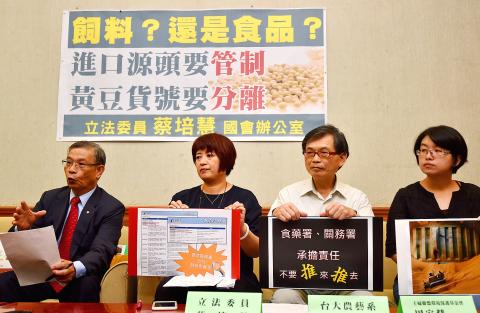While nearly 80 percent of soybeans used for food are genetically modified, the Customs Administration should strictly classify imported soybeans into different grades for different uses, Democratic Progressive Party Legislator Frida Tsai (蔡培慧) said yesterday.
A total of 2.685 million tonnes of soybeans were imported last year, but only 59,000 tonnes were non-genetically modified soybeans, she said, adding that soybeans are a common food ingredient.
According to a US agricultural report, Taiwanese consume approximately 280,000 tonnes of soybeans as food per year, which is much higher than the amount of non-genetically modified imported soybeans.

Photo: Chien Jung-fong, Taipei Times
“Soybeans should be classified and controlled when they are being imported,” Tsai said, adding that the Customs Administration should differentiate between “food-grade” and “feed-grade” soybeans, as well as “genetically modified” and “non-genetically modified” soybeans, to ensure food safety.
She suggested the agency use specialized commodity codes for the different types of soybeans.
Tsai also urged the Food and Drug Administration (FDA) to regulate that soybeans for food use must be non-genetically modified food-grade soybeans.
Genetically modified food-grade soybeans should only be used for making cooking oil, while feed-grade soybeans should not be made into any type of food, Tsai said.
A report made by Homemakers United Foundation earlier this year cited a Japanese study by the US Soybean Export Council, in which it said Japan imports about 3 million tonnes of soybeans per year, with 66 percent used for making cooking oil, 4 percent for animal feed and 30 percent for food use — such as making tofu, miso, natto and soy sauce.
Most of the direct food-use soybeans were non-genetically modified, it said.
Customs Administration Deputy Director-General Hsieh Ling-yuan (謝鈴媛) said imported soybeans are classified into non-genetically modified and genetically modified soybeans, and that differentiating between food-grade and feed-grade soybeans is technically possible, but it would require extra funding because custom officers are not able to tell them apart by sight.
FDA official Chen Hsin-cheng (陳信誠) said that it is possible to use different codes for the different types of imported soybeans and the agency would discuss the issue with the Council of Agriculture.

A preclearance service to facilitate entry for people traveling to select airports in Japan would be available from Thursday next week to Feb. 25 at Taiwan Taoyuan International Airport, Taoyuan International Airport Corp (TIAC) said on Tuesday. The service was first made available to Taiwanese travelers throughout the winter vacation of 2024 and during the Lunar New Year holiday. In addition to flights to the Japanese cities of Hakodate, Asahikawa, Akita, Sendai, Niigata, Okayama, Takamatsu, Kumamoto and Kagoshima, the service would be available to travelers to Kobe and Oita. The service can be accessed by passengers of 15 flight routes operated by

GIVE AND TAKE: Blood demand continues to rise each year, while fewer young donors are available due to the nation’s falling birthrate, a doctor said Blood donors can redeem points earned from donations to obtain limited edition Formosan black bear travel mugs, the Kaohsiung Blood Center said yesterday, as it announced a goal of stocking 20,000 units of blood prior to the Lunar New Year. The last month of the lunar year is National Blood Donation Month, when local centers seek to stockpile blood for use during the Lunar New Year holiday. The blood demand in southern Taiwan — including Tainan and Kaohsiung, as well as Chiayi, Pingtung, Penghu and Taitung counties — is about 2,000 units per day, the center said. The donation campaign aims to boost

ENHANCING EFFICIENCY: The apron can accommodate 16 airplanes overnight at Taoyuan airport while work on the third runway continues, the transport minister said A new temporary overnight parking apron at Taiwan Taoyuan International Airport is to start operating on Friday next week to boost operational efficiency while the third runway is being constructed, the Ministry of Transportation and Communications said yesterday. The apron — one of the crucial projects in the construction of the third runway — can accommodate 16 aircraft overnight at the nation’s largest international airport, Minister of Transportation and Communications Chen Shih-kai (陳世凱) told reporters while inspecting the new facility yesterday morning. Aside from providing the airport operator with greater flexibility in aircraft parking during the third runway construction,

MORE FALL: An investigation into one of Xi’s key cronies, part of a broader ‘anti-corruption’ drive, indicates that he might have a deep distrust in the military, an expert said China’s latest military purge underscores systemic risks in its shift from collective leadership to sole rule under Chinese President Xi Jinping (習近平), and could disrupt its chain of command and military capabilities, a national security official said yesterday. If decisionmaking within the Chinese Communist Party has become “irrational” under one-man rule, the Taiwan Strait and the regional situation must be approached with extreme caution, given unforeseen risks, they added. The anonymous official made the remarks as China’s Central Military Commission Vice Chairman Zhang Youxia (張又俠) and Joint Staff Department Chief of Staff Liu Zhenli (劉振立) were reportedly being investigated for suspected “serious